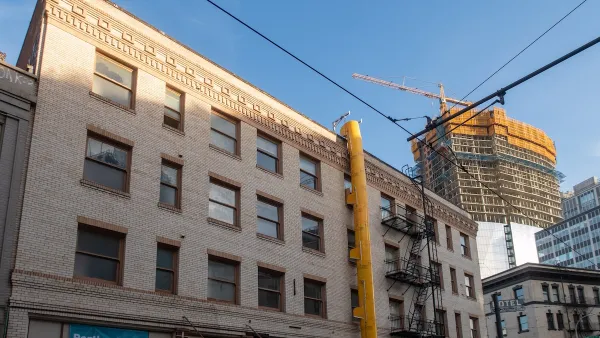OPB investigates the flood of new apartment buildings going up in downtown Portland and finds that two-thirds lack any motor vehicle parking - which is great for renters without cars seeking affordable housing, but can anger the neighbors.
Reporter/producer Rob Manning finds the new, parking-less buildings are going up because of new demand, not a change in city parking policy. What's creating the demand? Affordability, and a new wave of renters not needing auto parking.
"The cost of parking would make building this type of project on this location unaffordable," says Dave Mullens with the Urban Development Group, speaking of the 50-unit Irvington Garden in a close-in Northeast Portland with no parking places.
"Parking a site is the difference between a $750 apartment and a $1,200 apartment. Or, the difference between apartments and condos," he says.
"He says the Irvington Garden filled within weeks of opening, and has remained that way. He says the majority of renters don't have cars – though some do, and park on the street."
Portland parking policy is explained by city planner Tim Heron who "says the new push to build without parking fits within current zoning – and is consistent with the city's planning goals."
"Portland wants to grow up in terms of its density – and parking cars, meaning making the space and creating the space for them to park on a site can eat up a lot of space. So we've seen an increase in developers wanting to exercise a no-parking option, and use that space for units or for retail."
However, that may not sit well with some neighborhoods who "worry that without parking provided, tenants would jam the side streets with parked cars."
"Planners and developers say successful, no-parking projects have two things in common: frequent transit service, and a nice, walkable neighborhood."
Thanks to Len Conly
FULL STORY: No Room For Parking At Many New Apartment Complexes

Planetizen Federal Action Tracker
A weekly monitor of how Trump’s orders and actions are impacting planners and planning in America.

Map: Where Senate Republicans Want to Sell Your Public Lands
For public land advocates, the Senate Republicans’ proposal to sell millions of acres of public land in the West is “the biggest fight of their careers.”

Restaurant Patios Were a Pandemic Win — Why Were They so Hard to Keep?
Social distancing requirements and changes in travel patterns prompted cities to pilot new uses for street and sidewalk space. Then it got complicated.

DC Area County Eliminates Bus Fares
Montgomery County joins a growing trend of making transit free.

Platform Pilsner: Vancouver Transit Agency Releases... a Beer?
TransLink will receive a portion of every sale of the four-pack.

Toronto Weighs Cheaper Transit, Parking Hikes for Major Events
Special event rates would take effect during large festivals, sports games and concerts to ‘discourage driving, manage congestion and free up space for transit.”
Urban Design for Planners 1: Software Tools
This six-course series explores essential urban design concepts using open source software and equips planners with the tools they need to participate fully in the urban design process.
Planning for Universal Design
Learn the tools for implementing Universal Design in planning regulations.
Heyer Gruel & Associates PA
JM Goldson LLC
Custer County Colorado
City of Camden Redevelopment Agency
City of Astoria
Transportation Research & Education Center (TREC) at Portland State University
Camden Redevelopment Agency
City of Claremont
Municipality of Princeton (NJ)





























